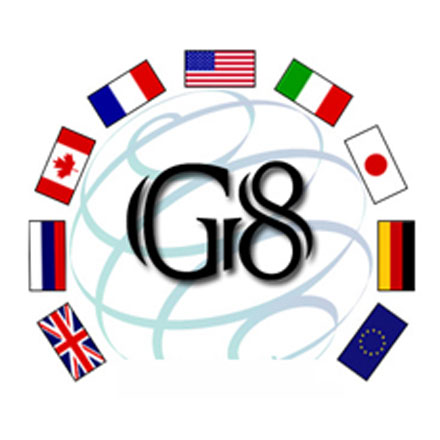Commentator of Trend European Desk Elena Ostapenko
The declaration by the G8 during its summit in Akvil testified that Europe can not take any measures against Iran, except psychological intimidation, and delays the time.
During G8 summit in the Italian city of Akvil on July 8-10, the participants agreed to settle the issue of Iran's nuclear program through diplomatic means. But it was decided to give Iran time until September to resolve the problems with the Iranian nuclear program, otherwise threatening stringent sanctions. Such a statement was made on the first day of the summit by the French President Nicolas Sarkozy.
"If until then, any progress is not recorded, we will be forced to take an appropriate decision," said the French President, without specifying how.
As the time to solve the Iranian issue, the participating countries identified the G20 summit, which will be held on September 24-25 in Pittsburgh (USA), said Sarkozy.
The United States and Europe, who are concerned about uranium enrichment in Iran, have repeatedly imposed trade and economic sanctions against it. The West considers that the uranium enrichment is aimed at developing nuclear capability in Iran, which supports terrorists and is preparing weapons of mass destruction. However, in its turn, Tehran claims that it wants to possess nuclear technology for peaceful purposes to generate electricity and rejects all proposals for negotiations.
First economic sanctions against Iran, many of which operate today, were imposed by the U.S. already in 1979. This was connected with the seizure of the American embassy in Tehran.
In 1980 all of Washington's diplomatic relations with Tehran were broken, a ban was imposed for export of all goods, including food and medicine, from the United States to Iran. Later, an embargo was imposed on the import of any goods from Iran to the United States, Americans traveling to Iran. Subsequently, all American presidents only toughened up sanctions against this country.
When Europe proposed Iran stop nuclear program, promising certain economic benefits in exchange, Iran agreed and stopped it for three years.
But in 2006 the Government of Mahmoud Ahmadinejad re-started it, which caused a series of new sanctions by the Bush administration. Amongst them, mainly there were sanctions against Iranian banks and companies and individuals, in this or other way related to the nuclear and weapons industry in Iran.
Since then, the sanctions have been extended. In total, the UN Security Council adopted three sanctions and five resolutions against Iran in order to suspend its nuclear program.
Despite Western pressure, Iran continues to develop its nuclear program and will continue to do so, knowing that Europe does not go beyond statements and unsubstantiated claims.
Europe and the United States "burned" in the unsuccessful attempt to introduce Western values and order in Iraq and Afghanistan. Today, no European country wants a repetition of the scenario in Iran.
In early 2002, U.S. President George W. Bush referred Iran to the countries that are members of the "axis of evil" alongside with Iraq and North Korea. United States always finds Iran amongst the states that support international terrorism, violate human rights, try to possess nuclear weapons, thereby violate international conventions.
The slight warming in relations emerged after Barack Obama, who does not deny the dialogue, came to power in the United States.
Thus, unless the situation between the main actors - Iran and the United States - is clear, the European countries will continue to be limited to the diplomatic maneuvers and a waiting position.
Do you have feedback? Contact our journalist at: [email protected]






